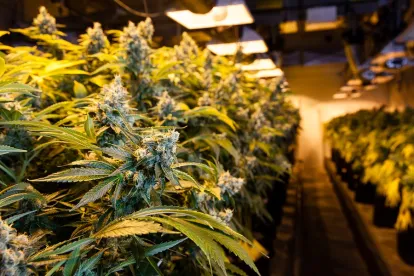Patentees and inventors of cannabis compounds may be happy to learn a district court in Colorado recently held that, based on the record before it, U.S. Patent No. 9,730,911, entitled “Cannabis extracts and methods of preparing and using same,” is not directed to unpatentable natural phenomena. United Cannabis Corporation v. Pure Hemp Collective Inc., No. 1-18-cv-01922 (Apr. 17, 2019, Order) (William J. Martinez).
The owner of the ’911 patent, Plaintiff United Cannabis Corporation (UCANN), is a biotechnology company that develops cannabis extracts for medicinal purposes. The ’911 patent is directed to various liquid formulations of enriched extracts of plant cannabinoids, which are chemical compounds that act on cannabinoid receptors in the body that affect the release of neurotransmitters in the brain. Specifically, the ‘911 patent purports to claim a liquid cannabinoid formulation, wherein at least 95% of the total cannabinoids is a specified cannabinoid or combination of them, and variations of the formulation that have requirements for terpenes and/or flavonoids, and require that the liquid is formulated for oral, sublingual, buccal, or topical administration. Accordingly to the Court in UCANN, “the obvious thrust of the patent is a supposedly new means by which humans can consume cannabinoids so that those cannabinoids can produce the pharmacological effects they are known to have, thus (hopefully) treating or ameliorating various diseases and symptoms.”
Pursuant to Section 101 of the Patent Act, patentable subject matter includes any “new and useful process, machine, manufacture, or composition of matter, or any new and useful improvement thereof.” The accused infringer in UCANN, Defendant Pure Hemp Collective Inc., sought to invalidate UCANN’s ‘911 patent on the basis that it claims natural phenomena, which the Supreme Court excepted from Section 101’s list of patentable subject matter, along with abstract ideas and laws of nature. The district court disagreed. While the Court acknowledged that “the proper application of the Supreme Court’s Alice standard is an evolving and sometimes hazy area of law,” it was “convinced under the current state of the case law that the challenged claims of the ‘911 Patent are not directed at unpatentable subject matter.” The Court was persuaded by UCANN’s argument that: “the claims are not directed to laws of nature or natural phenomena because they claim human-modified liquid formulations that require converting solid cannabinoids into a different state . . . .” The key word is “human-modified.”
Even accepting defendant’s argument that cannabinoids may appear in liquid form in nature, there was no evidence, nor did defendant claim, that the threshold concentrations of cannabinoids and related chemicals that the ‘911 patent claims, or anything close to them, occur in liquid form in nature. The Court concluded that the’911 patent “is instead ‘directed to’ a non-naturally occurring delivery method of naturally occurring chemicals in (as far as the record reveals) non-naturally occurring proportions and concentrations,” and denied Defendant’s summary judgement motion. Thus, UCANN’s infringement suit survives.
Whether you are an inventor, manufacturer, seller or practitioner, you might consider the UCANNopinion in your practice going forward. UCANN may be comforting to cannabis inventors and patentees who are hesitant to pursue claims related to substances which are illegal under federal law in federal court. Companies that manufacture and sell cannabis products might become more cautious of infringement liability, and/or consider patenting their formulations. And practitioners drafting patent claims directed to compositions of matter might consider adding limitations or dependent claims that clearly recite non-naturally occurring or “human-modified” proportions or concentrations of the constituent elements.



 />i
/>i
